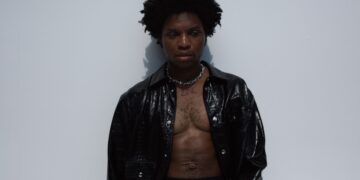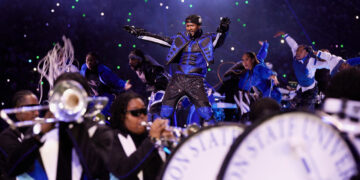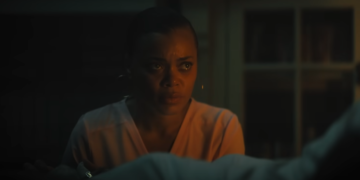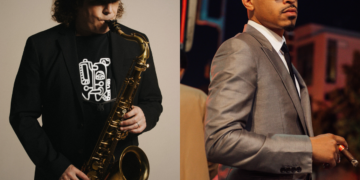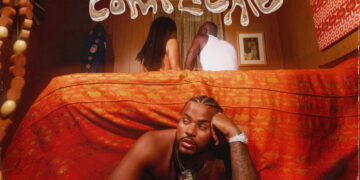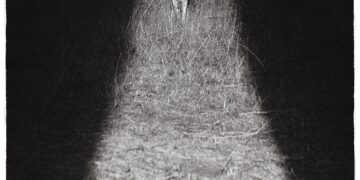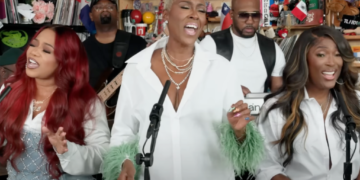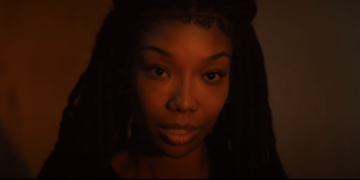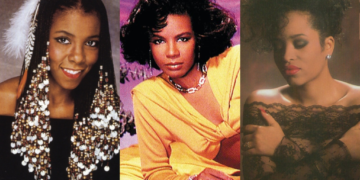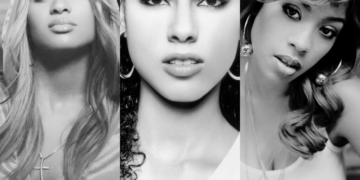What often goes unvoiced about the aptly-titled golden age of R&B is how gospel ascendancy produced some of the most notable moments of the decade.
In the ‘90s, reigning frontwomen such as Whitney Houston, Brandy and Kelly Price, whose religious foundations were profoundly embraced through their music, proved that rousing gospel vocals strengthened love songs of the day to truly connect the singer and the listener.
On the soaring opener of her debut album, Faith, Faith Evans belts, “I have the faith that can move any mountain / Faith that can conquer anything.” This inspirational declaration is seen as a statement toward not just her faith in God but also in her relationship and then-rising stardom as an artist.
Released on Aug. 29, 1995, under Bad Boy Records, Faith is a music rarity that sonically entwined Evans’ innate gospel foundation with the modern R&B sounds of the time. Conceived out of the deep love for her husband and rap phenom Christopher “The Notorious B.I.G.” Wallace, Evans turned spiritual cries into romantic yearns, delivering a successful gospel-infused R&B formula that would inspire artists to pursue the same artistic route in the years to come.
Evans started singing in church at an early age, shocking the congregation of Emmanuel Baptist Church in her hometown of Newark, Jersey with her angelic voice. After attracting the attention of Sean “Puff Daddy” Combs, a rising cultural hitmaker and shaper, Evans got the opportunity to employ her God-given songwriting ability on numerous projects, most notably Usher’s eponymous debut album and Mary J. Blige’s sophomore album My Life.
“Don’t Go,” a track from My Life co-written by Evans and produced by Combs and renowned musician and producer Chucky Thompson, is known for its clever fusion of the teary cries of Guy’s “Goodbye Love” with Debarge’s equally-somber ‘80s gem “Stay with Me.”
A peek behind the curtain reveals the subtle recreation of “Speak To My Heart” from The New York Restoration Choir’s I See a World album at the emotional ballad’s tale end, and epitomizes the extensive knowledge of gospel music that Evans brought to the table.
“Mary was more old school; like the quiet storm and stuff like that, but Faith was a totally different vibe. Her thing was more gospel,” Thompson, a key voice in the instrumentation of Faith, tells Rated R&B over the phone.
This anointed energy became even more prevalent on the powerful Thompson-produced torch ballad “Come Over,” which was inspired by vocal stylings of The Clark Sisters. “Won’t you come over and make love to me / ‘Cause I haven’t seen you in a while / really miss your smile,” Evans chants.
The lucidity of Evans’ plea matched with her crisp, heavenly harmonies and a hymnal-ready pipe organ leading this soaring cry exemplifies the level of emotion she carries throughout Faith.
Composing with non-secular motifs in mind became second nature for Evans, as many of the songs on Faith likely serve as double entendres; one foot in secular R&B, another in gospel.
The album’s hip-hop-heavy first song “No Other Love,” discusses a love that Evans believes is greater than any love she’s ever known. “No other love, I’m thinkin’ of / No other love can measure,” she belts on the track, possibly alluding to her love for God and her man.
Pressure is applied to this divine allegory on the soothing “You Are My Joy (Interlude),” where she sings about the love of her life being “her inspiration.” Enabled by her keystone of gospel, Evans was able to bring her style to the mainstream with tender and candid love songs.
With Faith, Evans’ gospel footing hints at more than just a tale of young love. Although her relationship with gospel serves as the framework for most of the album, Evans goes on to pay her respects to God with “Thank You Lord,” the album’s midpoint and interlude.
A celebration of God in its purest form, the brief piano-backed session calls back to the thick gospel harmonies and power of simplicity found on “Come Over” and brings this piece of her artistry full circle.
Pillars of tradition in the church are utilized in a variety of ways even years after they are taught. For Evans, the obligation of being a dedicated wife is something that was taken solemnly.
In 1994, she became Mrs. Wallace in August of that year after being in the relationship for only four months, and much of the emotion endured early in their union became the foundation of Faith’s overarching theme.
“She was just entering that relationship with B.I.G., and a lot of her emotions were based around that,” Thompson explains. “She came to D.C. and we would go to the studio and she would stay with me at my house. It was like at first he was chasing her, and then he got on the road and she ended up being the person with the feelings over him.”
A handful of the album’s more urgent cuts, including “You Don’t Understand” and “Soon As I Get Home” originated from those sessions where Wallace would be on the road for months at a time. Much like the spontaneity of Evans’ relationship, the latter song was devised in a similar fashion.
Thompson, who oversaw the production of “Soon As I Get Home,” describes it as the song Evans was most excited to work on, being that she practically begged Combs to have him produce the track.
“I get a phone call from Puff saying Faith pressed him to work on that song. He hadn’t even heard the song, he just knew she was passionate about it,” shares Thompson.
A satiny ballad that reads like a homely lullaby, “Soon As I Get Home” embodied Evans’ yearn to be held at a time when that was all but impossible. Its hook was simple, yet it carried the weight of pleasure, forgiveness, healing, and assurance that Evans longed for in her complex relationship. “Soon as I get home / I’ll make it up to you / baby, I’ll do what I gotta do.”
Dedication is a recurring trope on Faith, and “Ain’t Nobody,” written by Evans, Thompson and Combs, reveals a layer of the dynamic of loyalty Evans’ the album sought to display. Calling back to gospel is a call-and-response hook that illustrates a narrative of being saved by love when life seems hopeless.
With each passing verse, Evans’ riffs become more emote and the tale seemingly turns from sweet to unsettling, from “falling in love and I can’t get enough” to “I never knew that you would play games with my mind.”
Swelling strings and a pungent guitar lick over a thunderous breakbeat add to the track’s instrumental suspense. Evans was feeling the effects of her steadfast relationship, and she knew that it was overtaking the life she knew before.
Evan’s debut single, “You Used To Love Me” was an accident seemingly sent from heaven above. While it was originally intended to be sung by Bad Boy group Total, its central theme of giving but not receiving was undeniably Faith. The unrequited love ballad finds Evans looking back at “the time she put into this love affair” and evaluating her over-extending role in her relationship.
A need to let go but longing to hold on, the songstress makes a final plea for her lover’s heart on the song’s bridge; it is one of the strongest lyrical climaxes Faith has to offer.
“You can’t deny what I’m feelin’, it’s real / And I stood right by your side / Went through all the hurt and pain / Then you turned and walked away.”
A bold statement of Evans’ artistry, Faith not only introduced the First Lady of Bad Boy but was an affirmation of the emotional ups and downs she experienced. These direct inflections of passion are what make Faith stand out as a great work in R&B as it eventually shaped the era of the ‘90s as we know it. To this day, it’s hard to find an R&B artist that’s not influenced by Faith.
https://www.youtube.com/watch?v=kG0y5LIHNnw&feature=youtu.be
Fans and critics have cited artists like Keyshia Cole, Ashanti, and Fantasia as direct musical descendants of Evans and the road she paved. Cole, primarily, borrows heavily from this gospel influence that Evans created with fan-favorites like “Heaven Sent,” “Love,” and “You Complete Me.” Her hip-hop soul musical style is comparable to that of Mary J. Blige, but her metaphorical lyricism is without a doubt in the style of Evans.
Thompson says that the project inspired more hip-hop-inspired gospel and R&B. “I think a lot of her album was inspiring on the gospel side,” he says. “A lot of gospel groups were able to duplicate certain R&B aspects because that was a record that they could listen to.”
Even in more contemporary R&B sounds, it is arguable that artists like Daniel Caesar, whose debut album was embellished with gospel influences from his childhood, borrow from Evans’ artistry.
However, while the influence is still there, artists with that church upbringing are now few and far between. Less R&B artists are coming up with that gospel influence to back them up, but Thompson believes that the sound created by him and Evans prevails, nevertheless.
“That’s the part of R&B that everybody is missing to this day,” Thompson says. “That’s the conversation Pharrell and I had, like when are you gonna bring the real R&B back?’ It’s hard to bring that certain vibes when those vibes don’t exist. I’m an advocate of hip-hop, and hip-hop is all about what’s new. What we did with that album was just create something that fit her situation and fit the times. I appreciate that album for that.”
As one of the most preeminent and revisited albums of the 1990s, Evans’ debut album put the angelic-voiced songstress on the map. Several chart-topping hits and over 18 million albums sold later, her blend of church and mainstream sounds can be heard in many voices in the industry, R&B or otherwise.
Whether this influence is felt directly through the powerful gospel foundation or reinterpreted in complex, emotional storytelling, rekindling Faith will forever be a part of the narrative.
Stream Faith Evans’ debut album Faith below.







